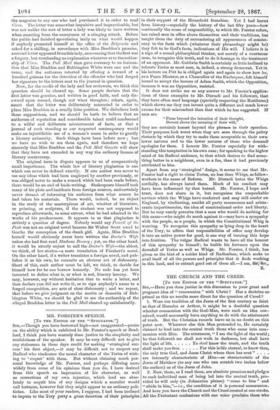MR. FORSTER'S SPEECH.
[To THE EDITOR OF THE "SPECTATOR."] SIR,—Though you have bestowed high—not exaggerated—praise on the ability which is exhibited in Mr. Forster's speech at Brad- ford, I think you have scarcely done justice to the simplicity and truthfulness of the speaker. It may be very difficult not to give any statesman in these days credit for making 'strategical suc- cess' his first object,—it may be difficult not to suspect any Radical who vindicates the moral character of the Tories of wish- ing to ' coquet ' with them. But without claiming much per- sonal knowledge of Mr. Forster, and perhaps differing more widely from some of his opinions than you do, I have derived from this speech an impression of his character, as well as corrections of my own injustice, which lead me abso- lutely to acquit him of any designs which a moralist would call tortuous, however fair they might appear to an ordinary poli- tician. Like most of your readers, I suppose, I had been inclined -to impute to the Tory party a great desertion of their principles in their support of the Household franchise. Yet I had learnt from history—especially the history of the last fifty years—how continually the sense of responsibility, to which Mr. Forster refers, has raised men in office above themselves and their traditions, has taught them the duty of surrendering all appearances of consist- ency to the facts which (whatever their phraseology might be) they felt to be God's facts, indications of His will. I believe it is a sign of a sound philosophical thinker, not merely of a courteous man, to recognize this truth, and to do it homage in the treatment of an opponent. Mr. Goldwin Smith is certainly as little inclined to tolerate Tories as most men, is, indeed, a strong democrat. Yet in his lecture on Pitt he is obliged again and again to show how he,' as a Peace Minister, as a Chancellor of the Exchequer, felt himself bound to accept the lessons of Adam Smith, which the Opposition„ because it was an Opposition, resisted.
It does not strike me as any answer to Mr. Forster's applies-
tions of these examples to Mr. Disraeli and his followers, that they have often used language (specially respecting the Residuum) which shows me they can invent quite a different and much lower- excuse for their misconduct than that which he has suggested. If men are "Pious beyond the intention of their thought, Devout above the meaning of their will,"
they are certainly honest beyond the phrases hi their speeches. Their purposes look worst when they are seen through the paltry rhetoric by which they try to make them acceptable to their own. lower natures and to the lower natures of those who demand1 apologies for them. I honour Mr. Forster especially for with- standing this temptation in his own case ; for speaking to the higher mind of his Radical audience, to that which desires to find some- thing better in a neighbour, even in a foe, than it had previously attributed to him.
Apart from any_' strategical ' design, it seems to me that Mr.
Forster had a right to claim Tories, no less than Whigs, as fellow- workers in the cause of Reform. Mr. Disraeli hates the Whigs cordially, has always hated them. Much of his conduct may have been influenced by that hatred. Mr. Forster, I hope and trust, does not share in it, but recognizes the unspeakable. services which the Whigs have conferred and may still confer on England, by vindicating, amidst all party meannesses and aristo- cratic impertinencies, the idea of constitutional order and liberty.. But he may surely perceive that a man who would do nothing for- this cause—who might do much against it—may have a sympathy with the people, as a people, in which the Constitutional Whig is wanting. To recognize this sympathy as lying deep in the heart of the Tory, to affirm that responsibilities of office may develop. it into an active power for good, is one way of turning this hope into fruition. The vulgar Radical wants to have all the honour of this sympathy to himself ; he builds his fortunes upon the downfall of Tories as well as Whigs. Mr. Forster, I think, has given us the hint of a nobler kind of Radicalism, which seeks to. avail itself of all the powers and principles that it finds working in this land, and to extract good out of them all.—I am, Sir, Sze.,
Z.






























 Previous page
Previous page